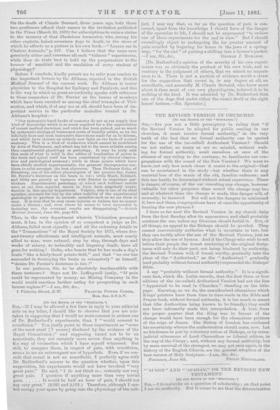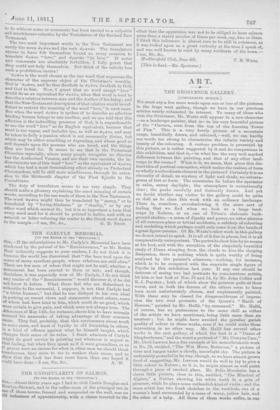"'ArIn[u" AND "'ATATIA - N," OR THE REVISED NEW TESTAMENT.
ere THE EDITOR OF THE "SPE0TATOR.1 Sne,—I do not write on a question of scholarship; on that point I am no authority. But it seems to me that the determination
to do without notes or comments has been carried to a culpable and mischievous extreme, by the Translators of the Revised New Testament.
The two most important words in the New Testament are surely the noun ic-piirs and the verb civalraY. The translators appear to have felt themselves bound ou every occasion to translate o'cycrL7rs "love," and ciyariim "to love." If notes and comments are absolutely forbidden, I fully grant that they could not help themselves. But think of the infinite loss such a prohibition incurs !
'Avivra is the word chosen as the one word that expresses the character of the supreme object of the Christian's worship. God is 'Aycil-s, and he_that divelleth in dzyciws dwelleth in God, and God in him. Now,-I grant that no word except " love " Would do as an equivalent for oiydore, when that word is used to describe a relation between man and the Author of his being ; and that the New-Testament description of that relation would be suf- ficient to restrict the meaning of the word " love," in such cases. But when the word icylvrn is spoken of to describe an affection binding human beings to one another, and we are told that this affection is the indwelling presence of God, it is unpardonable to use the word " love" as its English equivalent, because that word is too vague, and includes kor, as well as oiyair4, and may be taken to deify a passion which is not necessarily divine, but which may be either ennobling or degrading, and whose good or evil depends upon the persons who are loved, and the things they are loved for. It seems to me that in the Protestant Churches especially, where many people recognise no director but the Authorised Version, and are their own casuists, the in- discriminate use of this word " love " as the equivalent of cirle.7rn, which has had a most demoralising effect already on Protestant Christendom, will he still more mischievous, through its exten- sion to the thirteenth chapter of the First Epistle to the Corinthians.
The duty of translators seems to me very simple. They should make a glossary explaining the exact meaning of certain words, according to the use made of them in the New Testament. The word Aygigre might then be translated by " mercy," or be translated by " loving-kindness " or " charity," or by any other word which seemed fit ; but it is so important a term that every word used for it should be printed in italics, and with an asterisk or letter referring the reader to the Greek word yarn





























 Previous page
Previous page